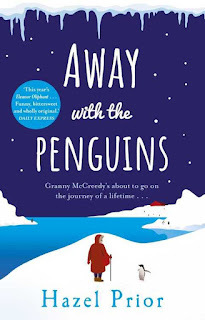Alex Pearl's Blog
September 8, 2025
If you loved 'Gregory's Girl' and 'Local Hero', you'll more than likely fall for 'The Ballad of Wallace Island.'

There is something a little disconcerting about encountering real-life film stars when going to see a movie. The last time this happened to me was at the National Film Theatre. I can’t remember the film in question, but when the film finished and the lights faded up, I found myself sitting directly behind the entire cast.
Yesterday’s encounter was far less dramatic. We were on our way to the lovely Phoenix cinema in East Finchley High Road and brushed past Daniel Mays walking his dog and talking quite loudly to a mate in his trademark cockney brogue. It was here at the Phoenix that I had last seen Mr Mays’ chops up large on the silver screen in the excellent Fisherman’s Friend. So this brief encounter might, I thought, be a harbinger of good things to come. As it turned out, I was right.
The Ballad of Wallace Island is one of those little British films that won’t win Oscars but will win plenty of hearts. It reminded me of the few wonderful films made by Bill Forsyth, not in its settings or themes so much as its ability to convey charm and something of this country’s psyche. Its premise is simple enough. Fictional folk duo McGwyer Mortimer, who were never that big but were hugely admired by a few loyal fans back in the day, have now split up, gone their own ways and disappeared into obscurity. Until, that is, they are approached by one of their most loyal fans, Charles, a man who is sartorially challenged and unable to stay quiet for a nano-second. A man who can’t stop himself from filling every pause with a stream of verbiage comprising poorly constructed literary quips and inanities. But despite his shortcomings, Charles has money, lots of money. He has won the lottery not just once, but twice. And as a result, now owns his own island on which he resides. As a massive fan of McGwyer Mortimer, his single-handed mission is to get the two back together again and host a gig on his island. The only problem is that McGwyer and Mortimer haven’t spoken for years and have their own emotional baggage to deal with. And their joint ego is going to have to adjust to a very peculiar live audience of just one.
Nell Mortimer and Herb McGwyer are played by Carey Mulligan and Tom Basden, respectively. And Charles is played by Tim Keys. The screenplay was written by both Basden and Keys. Without wanting to give anything away, the narrative unfolds gradually, and we learn a little more about the characters as the story progresses. The contrast between the slightly petulant and prickly McGwyer and his devoted fan Charles is beautifully performed, as are the musical numbers. And the excellent Carey Mulligan adds the right level of support. But I tip my hat particularly in Tim Keys’ direction. His role in the piece is pivotal. And again, I think back to Bill Forsyth’s Gregory’s Girl, in which John Gordon Sinclair is central to the film’s charm. Without his lanky, awkward and totally believable persona, the film would simply fall apart. The same goes for Tim Keys as Charles. He is totally believable and lovable.
The Ballad for Wallace Island is a very British movie that is charming, funny, and poignant in equal measure. Go and see it.
March 20, 2024
Introducing the first murder mysteries set in the world of advertising since 1933.
I wrote my very first novel back in 2011 — almost by accident. Allow me to elaborate.
Back in 2011, I was waiting to be made redundant from a large advertising agency that was undergoing a worldwide merger with New York’s second oldest agency. The merger of these two ailing giants was equated at the time to the Titanic coming to the rescue of the Hindenburg. As it turned out, the whole process took the best part of a year during which all work dried up. So to occupy my brain and to do something constructive, I decided to write a story for my young kids.
Fast forward twelve months and I was eventually given my marching orders and departed from said agency with a small crate of laminated press ads, a tatty Collins Dictionary, and a thick manuscript entitled Sleeping with the Blackbirds. Six months later the manuscript was converted into a nicely produced paperback with an endorsement by the actor and screenwriter, George Layton, courtesy of the independent publisher PenPress.
Today I have written four published novels, one short story, a collection of essays, and a collection of 100 author interviews. My most recent novels form part of a series of murder mysteries set in the pre-digital world of advertising. A Brand to Die For is set in 1983 and the sequel One Man Down in 1984 respectively. One Man Down will be published on 25 February 2025 by Roundfire Books, which is the fiction imprint of Collective Ink. The reason I chose to write them is twofold: firstly, it’s a world I know well having served at the sharp end of the industry during the ’80s. And secondly, there have been, as far as I can tell, no published murder mysteries set in the world of advertising since Dorothy L. Sayers penned Murder Must Advertise back in 1933.
The books are slightly unconventional murder mysteries in that my two unlikely protagonists aren’t particularly good sleuths and my criminals, or at least some of them, don’t always get banged up. While copywriter Angus Lovejoy is the product of an upper middle-class dysfunctional family, his art director partner in crime Brian Finkle is the only child of neurotic and over-protective Jewish parents.
The 1980s was arguably the Golden Age for the creative industries. And creative advertising in the UK was at its peak with agencies like Collett Dickenson Pearce, Boase Massimi Pollitt, Saatchi & Saatchi, and Abbott Mead Vickers leading the way with iconic campaigns that managed to plant themselves into the national psyche. These were the days when TV campaigns for the likes of Cadbury’s Smash, Heineken, and Yellow Pages to name just a few, were held in great affection by the British public and hailed as some of the best things on TV.
It’s little wonder then that this was also the industry in which some of our finest directors and writers cut their teeth. People like Alan Parker, Fay Weldon, and Salman Rushdie. This, of course, was also the age before the internet and mobile phones.
Politically, the 80s saw the rise of Margaret Thatcher and Thatcherism. It was a time that saw bitter conflict both at home and overseas with the miners’ dispute and the Falklands War.
So it was for all these reasons that I thought the ’80s would be a really interesting backdrop against which to set my murder mysteries. And I also made the conscious decision to have well-known characters from the period rub shoulders with my fictitious inventions. Indeed, One Man Down includes the appearance in one scene of the much loved comedian Julian Clary whose career was just beginning to take off in 1984. Julian very kindly read a couple of pages of dialogue attributed to his character and gave me permission to publish it, for which I remain extremely grateful.
This is the book blurb to A Brand to Die For:
WORKING IN ADVERTISING CAN BE MURDER — LITERALLY.
It’s 1983. Margaret Thatcher has been waging war on the Argentinians in the Falkland Islands. The miners are about to wage war on Margaret Thatcher. And Angus Lovejoy, once sent down from Charterhouse for shagging the Chancellor’s daughter in the cricket pavilion, has now landed himself a job as a copywriter at London adland’s creative hot shop Gordon Deedes Rutter where he is teamed up with art director Brian Finkle whose neurotic Jewish parents are the bane of his life. The two are an unlikely duo, but their mischievous and sardonic take on the world makes them a brilliant creative team. Everything goes swimmingly until a bizarre and mysterious murder rocks the world of Gordon Deedes Rutter and ripples out into the national media.
While the dearth of evidence leaves the police baffled, Lovejoy and Finkle, take it upon themselves to apply their creative brains to solve the mystery, and in so doing, inadvertently get themselves into particularly deep water.
And this is the book blurb to the sequel One Man Down:
THE TALE OF A STUMPED POLICEMAN, A THIRD MAN, AND A WELL-PLACED SHOT.
It’s 1984. Princess Diana has just given birth to her second child. The legendary comic Tommy Cooper has died on stage (quite literally). And Angus Lovejoy and Brian Finkle are gloriously oblivious to it all as they strive to enthral the nation with their television commercials for the advertising agency Gordon Deedes Rutter. But all is not as rosy as it might seem in the frenetic world of Soho. Following a disastrous presentation to a manufacturer of diarrhoea tablets, Lovejoy and Finkle let off steam by playing cricket for an old school friend — but in doing so, stumble upon a nest of vipers involving a gay vicar, a small-time antique fraudster, a photographer, and blackmail. There can only be one outcome and it’s going to entail murder.
If you’d like to read anything more about me and my books, not to mention, over 100 interviews with other far more eminent authors than myself, just head over to my website.

May 25, 2023
In conversation with author Bill Arnott
Alex: Tell me a bit about yourself. Yourbackground; where you were brought up; when you first began writing;your interests and so on.
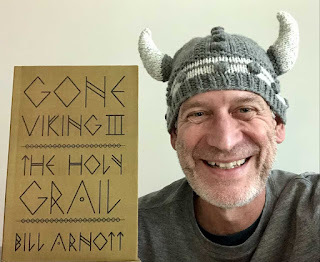 Bill: Hi Alex, thanks for having me back! I’mBill Arnott, an author, poet and songwriter from the west coast ofCanada, where I live near mountains and sea on Musqueam, Squamish,and Tsleil-Waututh land. I’ve been a writer for a number ofyears. Some readers might know my column Bill Arnott’s Beatfrom magazines and literary journals, others may be familiar with mybestselling travel memoirs, A Season on Vancouver Island andthe Gone Viking travelogues, Gone Viking: A TravelSaga, Gone Viking II: Beyond Boundaries, and GoneViking III: The Holy Grail, (RMBooks, publication date October 3,2023). I grew up in British Columbia, a partof the globe that enjoys distinct seasons and a range of outdooractivities. No doubt it instilled a love of being active in nature,something that’s never gone away. I’ve written for much of mylife, but only in the past few years has it become a vocation. Makinga living as a writer still feels like a privilege, and I find myselfexcited by it each day.
Bill: Hi Alex, thanks for having me back! I’mBill Arnott, an author, poet and songwriter from the west coast ofCanada, where I live near mountains and sea on Musqueam, Squamish,and Tsleil-Waututh land. I’ve been a writer for a number ofyears. Some readers might know my column Bill Arnott’s Beatfrom magazines and literary journals, others may be familiar with mybestselling travel memoirs, A Season on Vancouver Island andthe Gone Viking travelogues, Gone Viking: A TravelSaga, Gone Viking II: Beyond Boundaries, and GoneViking III: The Holy Grail, (RMBooks, publication date October 3,2023). I grew up in British Columbia, a partof the globe that enjoys distinct seasons and a range of outdooractivities. No doubt it instilled a love of being active in nature,something that’s never gone away. I’ve written for much of mylife, but only in the past few years has it become a vocation. Makinga living as a writer still feels like a privilege, and I find myselfexcited by it each day.Alex: How would you describe your writing,and are there particular themes that you like to explore?
Bill: While I’ve published books inmultiple genres, I tend to come back to nonfiction, specificallynature, memoir and travel. Much of it could be called nonfictionnarrative. I write what I love to read, and that often falls intoeach, sometimes all, of these classifications. I feel great writingcan supersede genre parameters. If the story’s a good one, writtenexceptionally well, then it ought to be shared and enjoyed. This issomething I strive to accomplish each time I put pen to paper, ormore accurately, finger to keyboard.
Alex: Are you a writer that plans adetailed synopsis or do you set out with a vague idea and let thestory unfold as you write?
Bill: I certainly start out with a plan, butrarely have a detailed synopsis. Each of my books has begun asvignettes, sensory experiences and visceral encounters orrecollection. These form the narrative, gelling into an arc, plot ortheme, with the story revealing itself from there. I’m stillmethodical in structure and cohesive flow, but find myself oftenpanning for gold, letting intuition guide me. If it reads well, issmooth and evocative, I’ll carry on, knowing a unique route willappear. If not, I’ll let that path be, for a while, knowing it’llbecome clear eventually.
Alex: Tell us about your latest book.
Bill: I’ll share a great quote and blurb.“Witty, well-read, effortlessly entertaining, Arnott may be theperfect travel companion.” This is from Thomas Lundy at CanadianGeographic Magazine, referring to Gone Viking III. (Hereceived an advance copy). The book is another epic adventure as Itrek the ancient world to unearth Viking secrets and reveal history’smost elusive treasure, the Holy Grail. I’d been granted afellowship at London’s Royal Geographical Society for my previousGone Viking expeditions, and now I take readers on a newexcursion following legendary explorers – Scandinavians, Celts, andArthurian knights – across Europe and into the Arctic. Together,readers and I share some adventures, learn a bit of history, and havea few laughs. In my role as narrator I serve as companion and guideon this quest, unearthing firsthand discoveries in Viking Greenland,Iceland, Norway, Sweden, Denmark, Britain, France, Switzerland,Belgium, Germany, Spain, Italy, Greece, Turkey, Poland, andJerusalem. A few years of intense travel and research, captured in300-pages.
Alex: What other books have you written?
Bill: Gone Viking III: The Holy Grail,is the final installment of the Gone Viking traveloguetrilogy. Following the success of the first book, my publishing teamat RMBooks and I felt a trilogy made sense, and that “the story,”or in this case my travel expeditions, could be completed andeffectively communicated in this manner. Each book is distinct, yetbuilds upon its predecessor. So, prior to this I wrote GoneViking: A Travel Saga and Gone Viking II: Beyond Boundaries.While international travel was on hold, I spent an incredible seasontravelling close to home, and created the memoir A Season onVancouver Island, another bestselling travelogue, in which Iinclude my painted photos from the excursion. (I turn photos intostylized paintings using a series of customized apps). That southwestcorner of British Columbia is a gorgeous part of the world and Ihappened to be there for three months of spectacular weather, so theartwork captures vibrant blue skies and ocean, rich forest greens,and a unique array of wildlife.
Alex: What are your interests aside fromwriting? And what do you do to unwind?
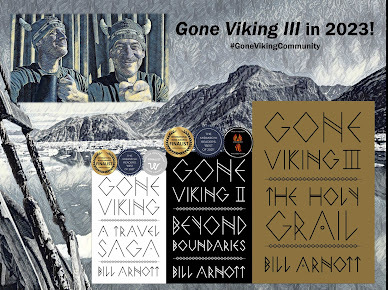 Bill: My social media handle,@billarnott_aps, refers to my being an author, poet, and songwriter,which is essentially how I unwind. I often find myself doing allthree activities every day, jumping between creative outlets tostimulate all of it. And I love being outside whenever possible.Walking, hiking, running, ideally near water or trees. I’m a bit ofan amateur ornithologist, so I love watching birds, and am frequentlydelighted to enjoy encounters with rather exotic animals and plantseven in the heart of an urban metropolis. Although it could beconsidered work, I spend a great deal of time connecting withreaders, replying to questions, hearing people’s stories, alongwith visiting bookstores and presenting to various associations.We’ve established a fabulous group of engaged readers, our#GoneVikingCommunity, in which people share photos ofthemselves with their copies of the Gone Viking books, oftenin a playful location or occasionally somewhere ridiculous. It’s agreat deal of fun, with a wonderful, growing audience. It’s agenuine privilege to be part of it all. Thank you again Alex, for this greatconnection and opportunity, and I wish you continued success withyour excellent books as well!
Bill: My social media handle,@billarnott_aps, refers to my being an author, poet, and songwriter,which is essentially how I unwind. I often find myself doing allthree activities every day, jumping between creative outlets tostimulate all of it. And I love being outside whenever possible.Walking, hiking, running, ideally near water or trees. I’m a bit ofan amateur ornithologist, so I love watching birds, and am frequentlydelighted to enjoy encounters with rather exotic animals and plantseven in the heart of an urban metropolis. Although it could beconsidered work, I spend a great deal of time connecting withreaders, replying to questions, hearing people’s stories, alongwith visiting bookstores and presenting to various associations.We’ve established a fabulous group of engaged readers, our#GoneVikingCommunity, in which people share photos ofthemselves with their copies of the Gone Viking books, oftenin a playful location or occasionally somewhere ridiculous. It’s agreat deal of fun, with a wonderful, growing audience. It’s agenuine privilege to be part of it all. Thank you again Alex, for this greatconnection and opportunity, and I wish you continued success withyour excellent books as well!Alex: My pleasure, Bill. Thank you for sharing your writing journey with us. Readers can learn more about Bill and his writing by visiting his website at https://billarnottaps.wordpress.com/
September 26, 2021
In conversation with Hazel Prior, author of the no. 1 bestseller 'Away with the Penguins'
October 26, 2020
David Abbott's haunting and beautifully constructed first and last novel deserves a wider readership.
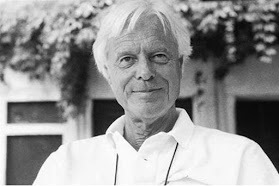 David Abbott is regarded as one of the finest advertising copywriters of his generation. As a young graduate back in the 80s, I remember the thrill of being offered a student placement at his agency Abbott Mead Vickers, along with my then creative partner. We were in our final year at art school and had set our sights on a career as a creative team in one of London’s creative advertising agencies. Luckily for us, one of AMV’s senior art directors had graduated from our college (Maidstone College of Art), so it only took a letter from one of our tutors to this former student to secure our two-week placement.
David Abbott is regarded as one of the finest advertising copywriters of his generation. As a young graduate back in the 80s, I remember the thrill of being offered a student placement at his agency Abbott Mead Vickers, along with my then creative partner. We were in our final year at art school and had set our sights on a career as a creative team in one of London’s creative advertising agencies. Luckily for us, one of AMV’s senior art directors had graduated from our college (Maidstone College of Art), so it only took a letter from one of our tutors to this former student to secure our two-week placement.On arriving at the allotted hour, we were ushered up to the creative floor of a recently refurbished building that had that distinctive new building smell. Everything was grey and black, which was the height of chic back in the late 80s. In fairness, it would still look sophisticated today. We had our own sizeable office for two weeks. But the greatest disappointment to befall us was that the great man himself was on holiday and would not return until we had departed. So there would be no chance to contrive an impromptu meeting with him in the company lift of a morning.
Abbott had cemented his reputation for writing memorable press ads for the likes of Volvo, Sainsbury’s, The Economist and Chivas Regal, to name but a few. But he was equally at home writing TV commercials, and his famous ‘J R Hartley’ TV commercial has gone down in advertising folklore as one of the UK’s best-loved commercials.
This said, he will always be remembered for witty headlines; and cogent, eloquent and perfectly structured copy. I remember one of his very long headlines for Chivas Regal that fuelled a lively argument at college. Some of us felt it was truly heartfelt while others found it overly sentimental and cloying. The press ad ran on Father’s Day and read as follows:
Because I’ve known you all my life.
Because a red Rudge bicycle once made me the happiest boy on the street.
Because you let me play cricket on the lawn.
Because you used to dance around the kitchen with a tea-towel round your waist.
Because your cheque book was always busy on my behalf.
Because our house was always full of books and laughter.
Because of countless Saturday mornings you gave up to watch a small boy play rugby.
Because you never expected too much of me or let me get away with too little.
Because of all the nights you sat working at your desk while I lay sleeping in my bed.
Because you never embarrassed me by talking about the birds and the bees.
Because I know there’s a faded newspaper clipping in your wallet about my scholarship.
Because you always made me polish the heels of my shoes as brightly as the toes.
Because you’ve remembered my birthday 38 times out of 38.
Because you still hug me when we meet.
Because you still buy my mother flowers.
Because you’ve more than your fair share of grey hairs and I know who helped put them there.
Because you’re a marvellous grandfather.
Because you made my wife feel one of the family.
Because you wanted to go to McDonalds the last time I bought you lunch.
Because you’ve always been there when I’ve needed you.
Because you let me make my own mistakes and never once said. “I told you so.”
Because you still pretend you only need glasses for reading.
Because I don’t say thank you as often as I should.
Because it’s Father’s Day.
Because if you don’t deserve Chivas Regal, who does?
Abbott later admitted that the ad was, in fact, a love letter to his own father. Whether you like it or not (I happen to like it), it’s a lovely example of Abbott's perceptiveness and his ability to tap into the way we humans think and feel. And it’s this emotive and powerful line of reasoning that imbues all his copy, whether he’s writing about crumple zones on Scandinavian cars or the health benefits of a Liga baby rusk.
When in 1998, he announced his retirement from the agency he founded in order to take up a new career as an author, none of us gasped in surprise. Here was a man who was already writing the most exquisite prose, albeit in a truncated form. And plenty of other copywriters had taken the plunge before him. Copywriters who certainly hadn’t received the kind of recognition Abbott had. There had been Fay Wheldon ( ‘Go to work on an egg’). There had been Peter Mayle (‘Nice one Cyril’ for Wonderloaf bread). And there had been Salman Rushdie (who readily admits to penning ‘naughty but nice’ for fresh cream cakes).
Admittedly, it took some while to complete his first work of fiction, but in 2010 Abbott’s debut novel ‘The Upright Piano Player’ finally hit the shelves. And quite some novel it is. It was clearly a labour of love as every line has been so well-considered and beautifully honed. Lines like this: Designer gowns from a former era, lovingly preserved in polythene, hang uneasily on bodies that have had no such luck. The book is peppered with such lines, yet the narrative is brisk and not the least bit laboured. And, of course, there’s that sharp perceptiveness about human nature and the little observations that lift the writing to another level. We also get a real feeling for the characters themselves through Abbott’s sharp ear for dialogue.
The story itself is an incredibly sad one and is structured like a Kurt Vonnegut novel starting at the end. But in all other respects, it is as far apart from a Vonnegut novel as you could possibly get. Many reviewers have compared the writing to Ian McEwan, and it’s a fair comparison. What is abundantly clear is that ‘The Upright Piano Player’ is an accomplished novel that can stand head and shoulders with anything written in the English language. As a debut novel, it's remarkable.
The story’s protagonist, one Henry Cage is a perfectly affable character on the surface. He has enjoyed a successful career as the founder of his own management consultancy business. But on retirement, it becomes clear that Cage’s personal life is anything but perfect. As the novel progresses, Abbott allows us to peek into Cage’s family dynamics and the fracturing of relationships, which could so easily have been averted. Added into the mix is a string of random incidents that have truly devastating consequences and are well beyond Cage’s control. Together the sequence of events makes for a tragedy of epic proportions and demonstrates the fragility of life. But don’t be put off. The narrative is utterly compelling, and you really do want to spend time in Henry Cage’s company. He is sharp, witty and likeable, if a bit obstinate and set in his ways. The closing line to the novel is utterly heartbreaking, as we know from the very first page how this story ends. And that’s another aspect that I think works so well with this novel. The way it has been structured is really clever. We know from page one how it ends but we don’t quite know how it gets there. But when we do finally get there and everything has been unravelled, the emotional punch of the very last page is enormous and gut-wrenching because we know that the last page isn’t actually the last page.
Having retired from advertising myself and written a couple of self-published novels, I have only just got round to reading ‘The Upright Piano Player’. But I am baffled by the fact that this fine book has received so few reviews on Amazon - no more than a paltry 38 ratings in ten years. My own self-published scribblings have notched up twice as many ratings in ten months. But I’d be the first to admit that my writing pales in comparison. So why on earth isn’t anyone reading this fine book that has been published, I might add, by a mainstream publisher (Quercus)? Am I and those 38 other reviewers on Amazon the only people to rate ‘The Upright Piano Player’ as a terrific read? Surely not.
I speak up for David Abbott’s novel not simply because I believe it to be an extraordinarily lyrical and haunting book, but because David Abbott cannot speak up for himself. He very sadly passed away rather suddenly and unexpectedly in 2014. He was one of the very few advertising men whose obituary made it into the national newspapers as well as the BBC news. This said, his debut novel only appeared as a foot-note among the reams of newsprint devoted to his contribution to British creative advertising. And yet this novel is undoubtedly his crowning achievement. The Guardian rightly described it as ‘a beautifully constructed debut.’ The saddest thing about ‘The Upright Piano Player’ is that it’s Abbott’s first and last foray into the world of literary fiction. We shan’t lay eyes on any other gems from this hugely gifted and overlooked author.
August 21, 2020
In conversation about advertising, copywriting and writing fiction
Alex Pearl talks to Kenneth Muyingo about writing for advertising agencies as a copywriter and writing fiction, with special reference to his latest novel, the thriller The Chair Man that is set in London in 2005.


June 27, 2020
Homage to Pete and Dud

Dud: This Coronavirus thing is a right pain.
Pete: You're not wrong there. I was only thinking the other day
what a right pain in the derriere - if you’ll excuse my French -
what a right pain in the derriere this wretched thing has become.
Dud: What gets me is they don’t even tell us why they call it
Coronavirus.
Pete: I can tell you why. It’s because they are completely in the
dark about it. So they’ve had to call it something wondrous and
ethereal to mask their total ignorance.
Dud: Wondrous and ethereal?
Pete: Yes. Wondrous and ethereal… Of course, they had to have
a bit of a brain storm to come up with the name. And then as if
by some divine providence, some bright spark would have come
up with the idea of calling it... ‘Coronavirus.’
Dud: On account of it being wondrous and ethereal?
Pete: On account of it being wondrous and ethereal.
Dud: So where does the name actually come from, Pete?
Pete: Well, there you’ve got me. But if I were a gambling man,
which of course I’m not… I would put my money on the name
itself being of Latin derivation.
Dud: Latin derivation?
Pete: Yes, Latin derivation… You see there’s nothing quite as
wondrous and ethereal as a bit of Latin derivation... I mean to
say, this Prime Minister loves his Latin.
Dud: I thought he loved the ladies.
Pete: Aside from loving the ladies, he also has a bit of a thing
about Latin.
Dud: You mean a little bit of Latin on the side?
Pete: Yes - a bit of Latin on the side... He loves his Latin. Can’t
get enough of the Latin… Only the other day he came out with a
lovely little gem. He can’t help himself. He’s always getting the
urge.
Dud: He’s known for his urges isn’t he?
Pete: Yes Dud, he is known for his urges. He has his fair share of
urges...
Dud: So what was this lovely little gem?
Pete: The lovely little gem in question was ‘Veni, vidi vici.’
Dud: Not being conversant with Latin, would you mind
transliterating?
Pete: I will even go as far as elucidating… Roughly translated
veni, vidi, vici means I came, I saw, and did all kinds of
unmentionables.
Dud: I see.
Pete: Course, he’s not the only one to be partial to the Latin. The
queen likes her Latin, too.
Dud: Does she?
Pete: She’s very partial to a bit of Latin is Her Highness. When
she had that fire at Windsor castle. You remember that don’t you?
Dud: Oh yes. Dreadful business.
Pete: Indeed… Well, she didn’t describe that year as being
thoroughly nasty.
Dud: Didn’t she?
Pete: No. She called it ‘Annus horribilis.’
Dud: Annus horribilis? Would you mind soliciting again?
Pete: Certainly... It’s Latin. In other words, an extremely wondrous
and ethereal way of saying that her year was in fact a bit of a
bummer.
Dud: Bit of a bummer?
Pete: Yes. You see the thing about Latin is that whatever you say,
it will will always sound wondrous and ethereal.
Dud: Seems a bit funny to me wanting to speak a language
nobody understands.
Pete: Well, if you can speak in a way that very few people can
actually understand, you are very well qualified to be Prime
Minister.
Dud: Why’s that then?
Pete: Well, just think about it. If you were Prime Minister, which,
thank goodness you aren’t, and you were asked a very difficult
question, which you didn’t know the answer to, what would you
say?
Dud: I suppose I’d be stumped for words.
Pete: Well you wouldn’t be stumped for words when you can
answer in Latin. Because by answering in Latin, you’ll be giving an
answer that no one will understand…
Dud: And I suppose you’d be confusing everyone in an ethereal
and wondrous way.
Pete: You would indeed be confusing everyone in an ethereal and
wondrous way… And that in a rather round-about way in answer
to your original question, is why this wretched virus is named
Coronavirus.
Dud: It’s all Greek to me Pete.
Pete: Well actually Dud you’re quite right. It is I believe also Greek
in derivation. Of course, the ancient Greeks were a very clever
bunch. Very clever indeed.
Dud: Interesting that you say that... Because there’s a very
ancient Greek gentleman who used to have a kebab shop near me
until he was closed down by health and safety. That wasn’t so
clever was it Pete?
Pete: Well you have to remember that some extremely ancient
Greeks do unfortunately suffer from dementia.
Dud: Dementia?
Pete: Yes. Dementia. The funny thing about dementia - and
there’s not a lot that’s funny about dementia - but the funny thing
is that dementia is actually Latin you know… (FADE)
© Alex Pearl 2020 All rights reserved
May 12, 2020
A talk about John Constable and his place in the history of landscpe painting.
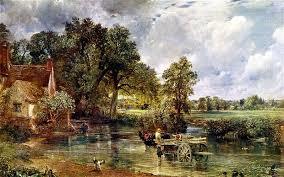
VIEW THE TALK BY ALEX PEARL HERE
Kenwood House Volunteer, Alex Pearl, gives an online Spotlight Talk on John Constable and his place in the history of landscape painting, with particular reference to the 1821 oil sketch commonly known as 'Hampstead Heath, with Pond and Bathers' one of the paintings in the great art collection at Kenwood House, London. John Constable (1776 – 1837) was born in Suffolk and lived in Hampstead from 1827. His paintings brought new life to the genre of landscape painting and constructed a particular image of the English countryside. Alex Pearl looks at some of Constable’s landscapes and cloud studies and explains how he took the practice of painting outdoors to new heights. Introduction and fade out music is by Carl Maria von Weber, Opus 79 published in 1821; Weber sought to bring Romantic music to a freer form, where feeling took precedence over form. Produced by Friends of Kenwood www.friendsofkenwood.org.uk With thanks to English Heritage Trust www.english-heritage.org.uk
March 19, 2020
My thriller, 'The Chair Man' is now FREE
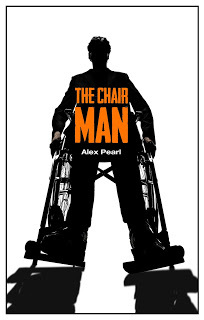 My thriller, 'The Chair Man' is now FREE to download thanks to Smashwords. You can download your FREE copy at: https://www.smashwords.com/books/view/1009862
My thriller, 'The Chair Man' is now FREE to download thanks to Smashwords. You can download your FREE copy at: https://www.smashwords.com/books/view/1009862The book was published at the beginning of the year by Fizgig Press and is beginning to garner some very positive reviews.
Here is what Graham Smith wrote last month:
"'The Chair Man' would make an excellent book club choice, stimulating discussion and lively argument. It contains masses of detailed information, selection from which can justify a wide range of interpretations. Many readers will admire Hollinghurst. He is a good father, particularly to his daughter Natasha, who considers him "the best frigging dad in the world", and he possesses "in spades" the "primal need to feel and protect your own flesh and blood." His son Ben thinks he "could always see the good in others." But that is exactly how many terrorists are remembered by almost all who knew and loved them.
"The nearest I ever got to a "terrorist incident" was in East London, when I heard the IRA bomb go off in Docklands in 1996. I cannot predict my reaction were I to be caught up personally in such events, but I hope I would not go the same way as Michael Hollinghurst, the central figure in this entertaining and elaborately-plotted novel. It is a gripping thriller that repays careful and close reading (and I will certainly read it again)."
Graham Smith 2020
The book is currently averaging 4.4 stars out of 5 on Goodreads and 4.7 out of 5 on Amazon.co.uk
You can download your FREE copy at: https://www.smashwords.com/books/view/1009862
'The Chair Man', the latest thriller to hit the bookshelves is now FREE
 The latest thriller, 'The Chair Man' is now FREE to download thanks to Smashwords.
The latest thriller, 'The Chair Man' is now FREE to download thanks to Smashwords.The book was published at the beginning of the year by Fizgig Press and is beginning to garner some very positive reviews.
Here is what Graham Smith wrote last month:
"'The Chair Man' would make an excellent book club choice, stimulating discussion and lively argument. It contains masses of detailed information, selection from which can justify a wide range of interpretations. Many readers will admire Hollinghurst. He is a good father, particularly to his daughter Natasha, who considers him "the best frigging dad in the world", and he possesses "in spades" the "primal need to feel and protect your own flesh and blood." His son Ben thinks he "could always see the good in others." But that is exactly how many terrorists are remembered by almost all who knew and loved them.
"The nearest I ever got to a "terrorist incident" was in East London, when I heard the IRA bomb go off in Docklands in 1996. I cannot predict my reaction were I to be caught up personally in such events, but I hope I would not go the same way as Michael Hollinghurst, the central figure in this entertaining and elaborately-plotted novel. It is a gripping thriller that repays careful and close reading (and I will certainly read it again)."
Graham Smith 2020
The book is currently averaging 4.4 stars out of 5 on Goodreads and 4.7 out of 5 on Amazon.co.uk
You can download your FREE copy at: https://www.smashwords.com/books/view/1009862

